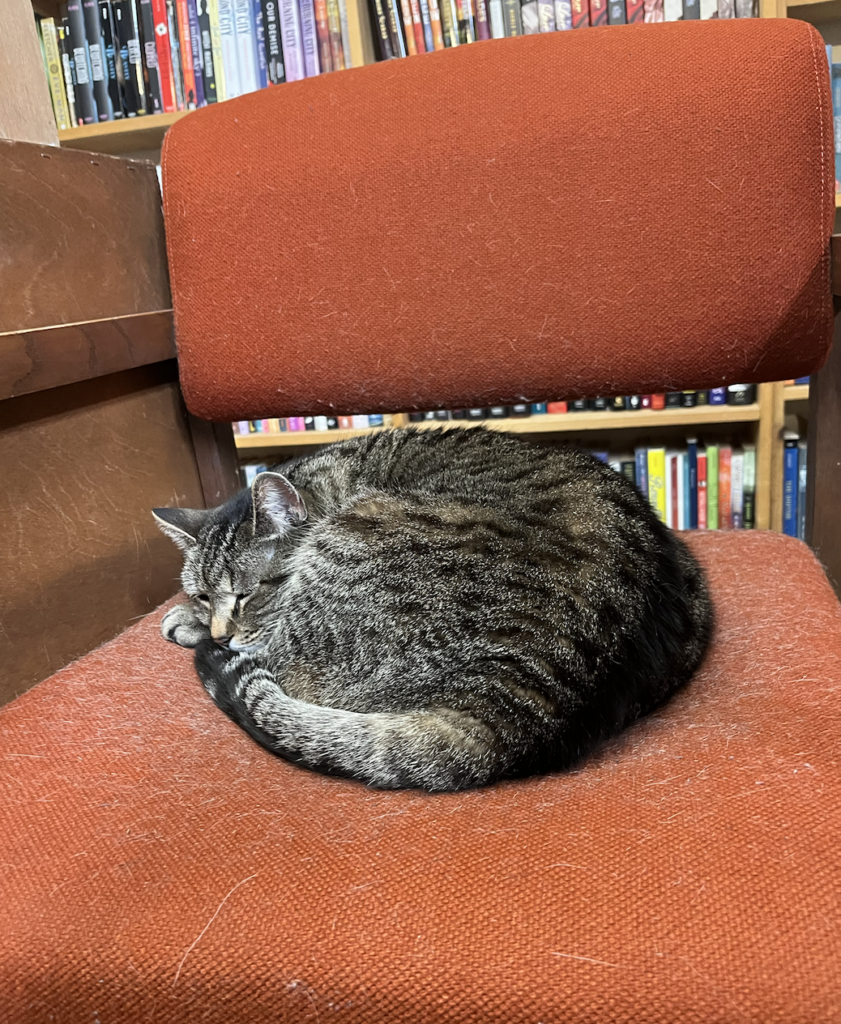By Emily Sharkis
Feature Writing Class
April 28, 2024
Stepping onto the property of the main location of the Book Barn in Niantic, Connecticut feels like entering a new world. Bright red picnic tables, lush greenery, and playground equipment all evoke a sense of childlike wonder. One might think the Barn was a nursery school if not for the main attraction: thousands of used books.
“During the busiest summer buying season, it’s standard for us to purchase anywhere from ten to fifteen thousand books a week,” said longtime Book Barn customer and employee Glenn Shea.
Many bibliophiles enjoy the wide variety of titles. “It’s like a little treasure hunt,” said UConn junior Emily Goodwin, “When I first get [to the Book Barn], I’m not overwhelmed. I feel this boost of joy being surrounded by books. Books just make me so happy because I know that every single one of them can take you away.”

While the Barn is known for having one-off copies of rare finds, the young adult section harbors plenty of multiples: rows of John Green novels, dystopian classics, and an entire shelf dedicated to copies of If I Stay by Gayle Forman.
The main building at the Main Barn holds an expansive young adult section, where customers can often find an adorable cat named Cheesepuff.
Goodwin, who just so happens to be my roommate, calls this section her favorite. “It’s very nostalgic for me because it’s all these books that I wanted to read or had read during my childhood,” said Goodwin.
The Book Barn also has two other locations. The Book Barn Downtown is a three minute drive from the Main Barn. Purchased as an overflow space, the Book Barn Downtown is full to the brim with children’s literature, fantasy, and unique titles such as How to Survive a Sharknado and Other Unnatural Disasters by Andrew Shaffer.
Opened in May 2014, Chapter Three sits right down the road from the Main Barn. This cozy spot sells Book Barn apparel and has a focus on romance, entertainment, and military titles. Visitors of Chapter Three are often greeted by the feline trio of cats Rosemary, Thyme, and Cutiepie. The expansive properties and unique quirks make the Book Barn feel like more than just a used book store.
“Many teachers bring their classes to the Barn stores as days out, and because the main property has play areas — swings, a slide, a playhouse, kid cars, a chess set–as well as a supply of cats and goats, they react to the Barn as if they were having recess,” said Shea, “We often hear stories from parents who tell us their child asked to come to the Barn for their birthdays.”
Goodwin first found out about the Book Barn through a Google search last summer. Driving down from the University of Connecticut took my friends and I about an hour, but compared to some of the Barns’ other customers, this distance is relatively short.
“We get visitors regularly now from all over, ranging from a couple who’d driven from Pennsylvania expressly to visit the Barn, to a family I see every year…that live in India, who come to buy books for their kids and bring me the gossip about what’s going on in Delhi,” said Shea.
Part of the reason people travel far and wide for the Barn is that they do not offer any kind of online shopping. When Randi and Maureen White opened the Book Barn in 1988, online bookselling was not nearly as popular as it is now. Plus, “Randi wanted to build the store up to have enough books to draw people in from a distance,” said Shea.
One of the biggest draws to used bookstores is the fact that their stock is often priced quite low. A fact that Shea says could not exist if the Barn went online.
“If we sold online we’d have to raise prices precipitously, as we’d need to hire at least two more people to do the cataloging and mail orders…Because the prices are low we have the best turnover I’ve ever seen in a secondhand bookshop; we regularly cull and dollar old stock. So all of this hangs together: people will come a good distance to find cheap books, we’re the only place locally that offers cash as well as store credit for books, and so all this saves us from having to deal with selling online. Randi didn’t want the best and rarest of our stock going out to someone sitting at home in Nebraska–he wanted to pull people in, and it’s worked,” said Shea.
It’s not just the low prices that draw in customers, however, it’s also the large sense of community that can be felt at all three Book Barn locations.
This sense of community starts with the booksellers themselves. “The emphasis when [Randi and store manager T. Hagan] interview or hire is that we all support each other when someone needs a day off, or has a medical emergency, so on and on. I know this sounds like corporatespeak, but it’s always great to see it in the flesh. I think this is visible to the people who come to visit and shop, and they often become part of the place as well,” says Shea, “I can’t tell you how often, when a customer has asked me a question I can’t answer, the answer has been called out by one of our regular customers, kibitzing from the side.”
As for the future, Shea says he hopes to keep up the good work, without any major changes. “God knows we have enough books, and we have enough customers. If something’s working as it should, you try not to jimmy with it.”
Leave a Reply